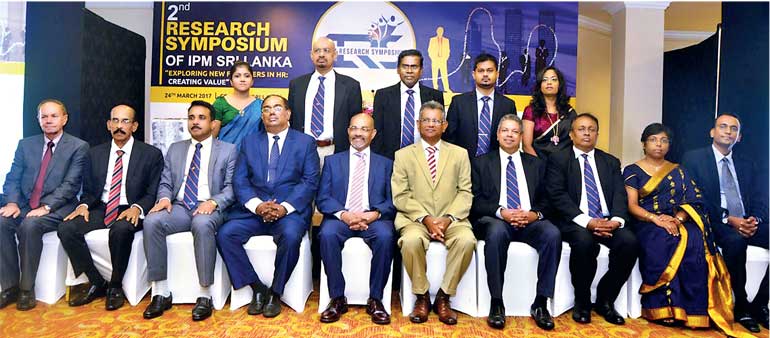Monday Feb 16, 2026
Monday Feb 16, 2026
Monday, 27 March 2017 00:02 - - {{hitsCtrl.values.hits}}

Key people involved in IPM’s second research symposium
Human resource management in the Sri Lankan context is gathering momentum, with many vibrant activities taking place. Yet capacity enhancement in both the private and public sectors requires more attention and commitment. HR-related research plays a key role in this context.
It was refreshing to recently witness the second research symposium of the Institute of Personnel Management (IPM) held with the fitting theme ‘Exploring new frontiers in HR: Creating value’. Today’s column is a reflection on revitalising HR research.
Overview
As we are aware, research in human resources falls into the broader category of management research, which in turn is a part of the wider array of social research. While positive initiatives are being taken, the current situation with respect to research in Sri Lanka is far from at a satisfactory level. We have an acute gap to bridge with regard to the current and desired levels of engagement in HR research. Hence, we need a rigorous drive in search of HR research excellence.
“Students as well as practitioners of HR are convinced that there is a dearth of research-based literature on the theory and practice of HR in the context of the development challenges faced by Sri Lanka.” That’s what the late Professor Sudatta Ranasinghe, who was a true friend of IPM, wrote on the importance of HR-related research.
The vitality and the vibrancy required in relation to HR research are indeed valuable. That’s why we need a rigorous drive in exploring new frontiers in HR with value creation. I recall reading an article written by Dr. Jayaratne Pinikahana sometime ago highlighting the need to focus on the private sector to collaborate in university research. He shared some revealing statistics about local research.
“Sri Lanka contributes only 0.17% from GDP whereas Singapore contributes 2.3%, South Korea, 2.9% and China 1.3% from their GDP for research. A recent report published by the Ministry of Technology and Research in Sri Lanka revealed that Sri Lanka has only 287 researchers per million which is less than the world average of 894. The average number of researchers per million in the developed world and the developing world is 3,272 and 374 respectively. It is clear from these statistics that the Sri Lankan situation is worse than the average Third World situation. The most alarming situation is that it has been getting worse in recent years. For example, in 1996 Sri Lanka had 6,000 full-time researchers, including university researchers, but by 2006 this number declined to 4,200,” he wrote.
In such a context, any move to strengthen the research rigour, particularly by a professional body such as IPM, is noteworthy. As I observe, there is a clear need to create better awareness about the importance of research, especially in the field of HRM.
HR research symposium
Last year a small but significant step was taken in launching a research symposium as part of the National HR Conference of IPM. This year, the HR symposium stands on its own with a distinct identity as a sought-after HR research forum in Sri Lanka.
The Research Committee of IPM, led by Dr. Bhadra Arachchige, played a key role in making this event a reality. Dr. Tissa Ravindra Perera acted as the co-chair of the research symposium.
“The future of the HRM profession in the country depends on our ability to identify new directions, many of which will no doubt be the result of effective  research,” said the co-chairs in their message at the symposium proceedings. It was indeed an engaging and enriching endeavour in ensuring HR research excellence.
research,” said the co-chairs in their message at the symposium proceedings. It was indeed an engaging and enriching endeavour in ensuring HR research excellence.
“Research is to see what everybody else has seen, and to think what nobody else has thought,” said Albert Szent-Gyorgyi, a Nobel Prize-winning Hungarian psychologist. It is, in fact, developing a third eye to see beyond what is obvious.
The field of HR in Sri Lanka would benefit immensely if it was the norm to have insights that went beyond mere information when making people-related decisions. HR research is of the utmost importance, in this sense, globally and locally alike.
While the journey of revitalising HR research is moving ahead, the required enthusiasm and effort from the HR community is essential. We see a key challenge here. Several Sri Lankan HR academics, based on their sheer passion, have been able to publish their HR-related research in reputed international journals.
Furthermore, several HR professionals have embarked on joint research studies with their academic counterparts. Student research work related to HR has also been encouraging. These positive trends speak of better times for HR research in the time to come.
Glimpses of the proceedings
The proceedings of the symposium contained several salient features. The keynote address by Prof. Danture Wickremasinghe of the University of Glasgow, UK was thought provoking and insightful. He stressed the importance of “scholarly engagement” and “engaged scholarship”. In essence, the HR research requirements in a “neoliberal” world were emphasised. Dr. Chandra Embuldeniya, participating as the Chief Guest, highlighted the importance of conducting research on changing employment landscape, with the emergence of knowledge-intense industries.
There was an interesting industry survey on employee engagement in the apparel, IT and BPO sectors in Sri Lanka with a sample of 12,000. Six final year MBA students of the Postgraduate Institute of Management (PIM), together with their co-supervisors, Samantha Rathnayake and me, presented their findings. It involved the development of a homegrown Employee Engagement measurement tool and the testing of it in the above mentioned industries. It was a refreshing review of the status of employee engagement in Sri Lanka.
In an interesting featured presentation, Dr. Sunil Jayantha Navarathna highlighted the features of Human Capital management with research insights on what he called the K-SAM (Knowledge, Skills, Attitudes and Mindset) model.
Impetus from initiatives
The revitalisation of HR-related research at IPM began around five years ago. We used to meet as the Research Committee once a month at IPM. It was an occasion where we brainstormed over the concept and contents. Also, one key evening presentation we organised also gave us much motivation. Research related to human resources (HR) and its how, when and why was the topic of discussion at a panel discussion titled ‘Conducting HR Research’.
The main focus of the panel discussion was to enhance the quality of research of the institute’s students and to contribute towards the progress of the profession through research. The main discourse on the topic ‘Conducting HR Research’ was provided by Senior Prof. H.H.D.N.P. Opatha.
I recall how he provided the audience with insightful information on research, particularly related to HR, focusing on the ‘how, when and why’ of HR research. The different types of research, the need for research and how to conduct research, was elaborately explained by him. The panellists drew attention to the imperative aspects of HR research discussed and further deliberated upon the different aspects of proper literature review in conducting research. The panel also exchanged views on the different sources for literature which are ideal for HR research.
The HR Perspectives Journal (HRPJ) is the research publication of the IPM that was re-launched five years ago. Now it is published biannually with HR research articles having quality and relevance. Dr. Bhadra Arachchige is the current Editor of HRPJ.
Papers presented
There were 12 papers representing a wide array of HR-related topics presented at two parallel technical sessions. They were chaired by Dr. Trevor Mendis and Dr. Pavithra Kailasapathy. Other panellists included Dr. Alan Robertson, Dr. Arosha Adhikaram, Dr. Sheshika Kumaraperuma, Janaka Kumarasinghe and T. N.S. de Peiris. The papers have been reviewed by a large number of academics including Dr. Travis Perera, Dr. N.N. J. Nawarathne and Prof. Prasadini Gamage.
‘Acceptance of social networking sites recruitment by Sri Lankan HR practitioners’ by T. R. Wijesundera and H.P. Rasika Priyankara drew much interest from the audience. ‘Creating value through executive coaching: A relatively new frontier in HRM in Sri Lanka’ was the topic of the paper presented by Jayantha Pathirathne. ‘Impact of generation Y employees’ work values on their preferred leadership style’ was presented by M.S.J. Fernando.
Among the other papers were ‘Factors affecting migration intention of medical practitioners’ by S.M.P. Weerasinghe, ‘Solicitation of leader-member exchange theory in the technology sector of Sri Lanka’ by G.R.P. Silva and ‘A study of awareness on HIV/AIDS among employees in Colombo’ by Romita de Silva are worth mentioning.
Way forward
The time has come for us to create a renewed enthusiasm on HRM research. Also, we need to ensure the findings of such research are meaningfully used for better policymaking and practical implementations. Understanding the complexities of human behaviour as individuals, interactive groups and institutions is an uphill task demanding continuous research engagement.
The second annual research symposium organised by IPM as a professional body itself highlights the value in bringing knowledge creators and knowledge appliers together in a meaningful manner. We will strive for continuous improvement in embarking on more national level research which will have wider socioeconomic implications.
(Prof. Ajantha S. Dharmasiri can be reached through [email protected], [email protected], [email protected] or www.ajanthadharmasiri.info)